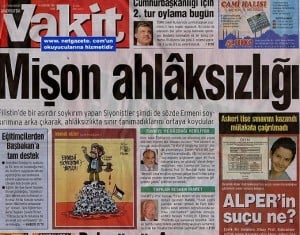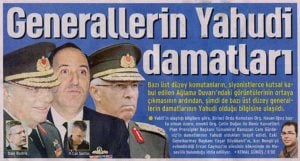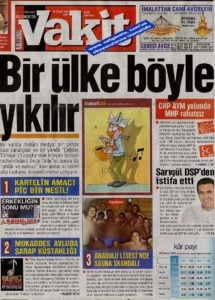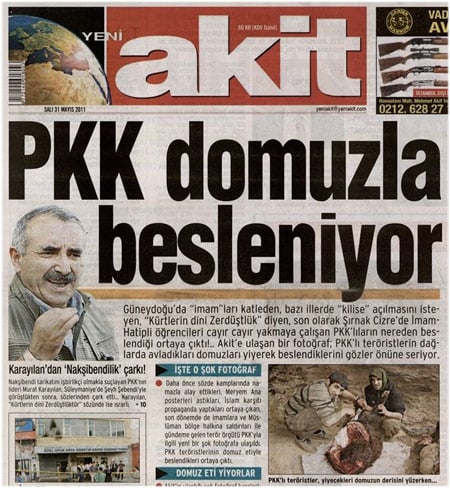
Caricature: A Jewish man, called 'the Zionist thing,' holding an ax, stands on an island of skeletons of Palestinians in a sea of blood. (Source: Vakit)
A textbook case of hate speech in Turkish media: The story, entitled ‘Mishcon Indecency,’ suggests that “Zionists, who have been doing ethnic cleansing in Palestine for over a century” show that “they have no limit to indecency (or moral corruption)” because some members of the Israeli lobby in the United States supported a U.S. House of Representatives Resolution that was against Turkish interests. Note that the title includes the Turkish version of the common Hebrew name, Mişon (Mishcon), in an attempt to symbolize and generalize Jews. Although it is the Jewish lobby that supported the resolution in the U.S. Congress, the article uses ‘Mischon’ and ‘Zionists,’ not Jewish lobby or Israeli lobby. It also has the hidden message that suggests that ‘it was already known that Jews have no decency’ and ‘their’ decision to support the anti-Turkey resolution in the U.S. Congress ‘proves it’.
Although there is no universally accepted definition of the term hate speech, most states have adopted legislation to address the problems caused by it. Prejudice, racism, xenophobia, homophobia, Antisemitism and discrimination are all underlying motives of hate discourse. According to the Council of Europe Committee of Ministers Recommendation 97(20),
“hate speech covers all forms of expression which spread, incite and promote or justify racial hatred, xenophobia, anti-Semitism, or other forms of hatred based on intolerance including: intolerance expressed by aggressive nationalism and ethnocentrism, discrimination and hostility against minorities, migrants and people of immigrant origin.”[i]
The European Commission 2011 Progress Report on Turkey emphasizes that Antisemitism and hate speech in the media (targeting missionaries or Christians in general) remain an important issue. Despite national and international calls, the Turkish government has not addressed hate speech and hate crimes in the country. Therefore, Turkish media has absolute freedom in publishing reports and commentaries full of insulting and defamatory content. Not only are the issues reported with extreme manipulation of the facts (based on ideological and political affiliations of the newspaper), they often include hate speech.
For example, in the country’s ultraconservative Islamist newspapers Milli Gazete and Vakit (known as Yeni Akit since 2010), the staunch supporters of the ruling AK Party, one can find defamatory content about Armenians, Christians, Jews, gays, and AK Party’s political opponents. Moreover, these papers use ‘being of Jewish/Armenian/Greek origin’ or ‘having a Jewish relative’ or even ‘allegedly being of Jewish/Armenian/Greek origin’ as defamatory phrases to ‘vilify’ the targeted group or individuals (often political opponents of conservative groups, the AK Party and their allies):

(Source: Yeni Akit)
A commentary appeared in Yeni Akit in November 2011, entitled ‘Generals’ Jewish Son-in-laws,’ aims to vilify and defame the Turkish military, because some of its generals have son-in-laws who happened to be of Jewish origin. According to the article, it is “strange” that after the “discovery” of footage showing high ranking Army officers at the Wailing Wall (Western Wall), which is accepted as a holy site by the “Zionists,” it is now “discovered’ that “some generals have Jewish son-in-laws.” Here, the purposes is to attack the presumed opponents of the AK Party (and the Islamist ideology the newspaper represents) by associating them with something or someone that is “Jewish,” as if it is something threatening, immoral or bad.
In another story, the same newspaper attempts to vilify Büşra Ersanlı (a Turkish academic who has been detained on the charges of being a member of the KCK, the alleged urban wing of the terrorist Kurdistan Workers’ Party, PKK). The article’s title is ‘Ersanlı’s Jewish lover (Ersanlı’nın yahudi aşkı), in reference to Ersanlı’s former husband who is a Turkish-Jew. There is a clear effort to associate Ersanlı with something ‘Jewish,’ and more importantly, the article suggests that ‘the Jewish link’ shows the “truth about Ersanlı,” again, as if it is something concerning for the reader.
What people see in the media has influence on their perceptions. Therefore, hate content shouldn’t be seen as just mere propaganda – it may actually provoke and incite violence:

(Source: Vakit)
In 11 July 2009, a group of youngsters from the youth movement of the far-right Grand Union Party (BBP) disrupted a concert organized at Istanbul’s Topkapı Palace. The main sponsor of the event, a local wine company, had promoted the concert with banners saying ‘Take your wine and come enjoy the full moon,’ and ‘Tchaikovsky, wine and sunset: What else is there to say?’ A week before the event, Vakit began publishing commentaries (in its print and online editions) emphasizing that wine was to be served “right next to Prophet’s belongings” at Topkapı Palace which was “once filled with the voices of Ottoman soldiers reciting Quran before going to battle.” “This is how a country is destroyed” and “wine audacity in sacred courtyard,” read the titles of the newspaper.
In its latest report on the subject (Hate Crimes in the OSCE Region: Incidents and Responses), the Organization for Security and Cooperation in Europe (OSCE) underlines ‘intolerant discourse’ as an important factor contributing to the occurrence of hate crimes. Moreover, the OSCE Office for Democratic Institutions and Human Rights stresses that hate crimes “pose a serious threat to domestic and international security, thus undermining societal cohesion by sowing the seeds of conflict and wider-scale violence.”[ii] Therefore, they not only harm the individual or group targeted in the crime, but affect the entire community to which the victim belongs.
The Association for Social Change (ASC, Sosyal Değişim Derneği in Turkish) is a leading organization focusing on the hate issue in Turkish media. Their 2009 report, entitled ‘Hate Crimes in National Media: 10 Years, 10 Cases,’ covers the years between 1998 and 2008 and focuses on a large selection of newspapers that represents most political and ideological sides in Turkey.[iii] The ASC researchers investigated hate speech instances in ten categories including ethnic background, nationality, gender, sexual orientation, and religious affiliation. Of the 30,000 articles and commentaries investigated, the researchers analyzed 200 pieces in detail and provided ten ‘textbook cases of hate speech’ for each category.

(Source: Association for Social Change)
According to this study, 79 percent of all material analyzed is characterized as ‘hate crimes’ leaving the hate speech with 21 percent. 24 percent of all hate crimes are related to ethnic identity, followed by those related to political identity (19 percent), sexual identity (16 percent), and religion (16 percent). Moreover, a staggering 47 percent of all hate speech instances are related to ethnic identity. Categorized as a single unit, ‘hate crimes and hate speech’ related to ethnic identity tops the list of ten categories with 42 percent. It is followed by religion (20 percent), national identity (11 percent), and political affiliation (11 percent). Of all the newspapers studied, Yeni Şafak, Milli Gazete, Vakit and Zaman – all conservative newspapers and staunch supporters of the AK Party – have the highest number of hate speech content about religious identity.[iv]
The study also revealed that there is more hate speech against certain groups in certain dates. For instance, before or on April 24 (Genocide Remembrance Day in Armenia) of every year, there was a recognizable increase in the negative and discriminatory discourse against the Armenians. Similarly, before or on March 21st (Nevruz), discourse against the Kurds and the Kurdish identity was more offensive. Another important finding that must be mentioned here is that hate speech about sexual orientation and identity is common in almost all newspapers regardless of their political and ideological affiliation.

The headline reads "PKK feeds on pork," and the article suggests that "the PKK members who 'slay Imams' and 'want Churches' in the East, are 'apparently' feeding on pork." Here the purpose is to associate the PKK with Christianity, as if it is a bad thing, to curtail the organization's influence among Muslim Kurds. (Source: Yeni Akit)
Hrant Dink Foundation is another organization that is focusing on the hate issue in Turkish media. The foundation has an ongoing project called ‘media watch on hate speech’. The project allows readers to submit hate speech cases via the Internet to the project website. According to their latest reports, there is an increasing hate speech against missionaries and Christians in Turkey.[v]
I think part of the increase in hate speech against missionaries may be related to the emergence of “PKK is against Islam” themed reports and commentaries. Since early 2011, there has been a visible increase in stories in which PKK members ‘eat pork’ and ‘exercise shamanic rituals,’ while the security forces find ‘bodies of uncircumcised PKK members.’ Reports about ‘PKK members converting in masses to Christianity to obtain financial support from Christian aid and missionary organizations’ are also being circulated regularly in Yeni Akit, Milli Gazete and Sabah. It is known that the government has been trying to counter PKK’s influence in country’s eastern provinces by a strategy, which I call 3D+I, or Defense, Diplomacy, Development and Islam. There is strong resistance to this policy among the Kurds, but the pro-government media seems to catch up with it.
Another organization, Kaos GL, the most active NGO promoting the rights of LGBT (Lesbian, Gay, Bisexual, and Transgender) community in Turkey, is focusing on homophobia in Turkish media. The organization has recently won a legal case over ‘perverts’ insult (in an article appeared in Yeni Akit) on Turkey’s High Court of Appeals (Yargıtay). Kaos GL’s lawsuit against Yeni Akit was initially rejected by two Ankara courts on the grounds that the newspaper was ‘within the limits of criticism.’ The Supreme Court of Appeals, however, overruled the previous decision stressing that ‘the freedom of the press does not encompass the freedom to insult the personal freedoms of individuals.’ Since the Supreme Court of Appeals is the highest court for reviewing verdicts given by courts of criminal and civil justice, its decision sets a precedent for future lawsuits.
The good news is, there is growing public attention on hate speech and hate crimes in Turkey. In January 2012, more than fifty NGOs announced that they have come together in a campaign to demand hate crimes legislation in the new Turkish constitution. The Campaign for Hate Crime Legislation (Nefret Suçları Yasası Kampanyası) is perhaps the most important step to date in Turkey for addressing hate speech and hate crimes. However, the AK Party, which has the majority in the parliament, has not taken any step for such legislation yet.
I think the hate speech problem in the Islamist and pro-government media shows yet another shortcoming of ‘Turkey as a model to the Middle East’ concept. It is very confusing that, the AK Party, which has been promoted as the ‘champion of democracy’ in Turkey and the ‘model political movement for democracy and development in the Middle East,’ has not addressed the problems caused by hate crimes. More interestingly, the newspapers, which have the highest Antisemitic, homophobic, racist, insulting, and defamatory content, are the ones that have been the closest media allies of the AK Party government.
UPDATE, February 6, 2012:
As I was doing my daily readings of Turkish media, I saw an article on habervaktim.com discussing the hate speech legislation campaign I mentioned above.
Here is a quick translation of what the article suggests:
Lately, while the so-called ‘hate speech legislation’ campaign has been introduced as if there is a hate speech problem in Turkey, it is discovered that Jews’ newspaper Şalom is behind provocative activities. Although hate crimes legislation is not in the agenda of the majority of the people, marginal groups are working to introduce the so-called problem in West’s agenda. Marginal groups such as those which portray sexual perversion in their activities are supported by those who claim to be the representatives of Jews, Greeks and Armenians in Turkey.
Here, the message is “the majority” doesn’t have a problem with hate speech and only “marginal groups such as those who portray sexual perversion” are supporting this issue because, in the background, “the Jew” supports them. It is important to note that the concept of “support/will of the majority” is used to “justify” certain policies by ultraconservative newspapers. The newspaper tries to avoid calling gays “perverts,” but make use of another homophobic phrase “sexual perversion,” while it also attempts to discredit those who support the hate crime legislation as if they are not the ‘real the representatives’ of the minorities in the country. The article also openly calls Şalom as the ‘behind-the-curtain’ mastermind of the ‘so-called hate crimes issue’ in Turkey, which the newspaper suggests is an attempt to discredit Turkey in the West.
_____________________
[i] For those who are interested, Manual of Hate Speech (Council of Europe) is a good source for understanding key definitions, concepts and historical evolution of hate speech.
[iii] I noticed that ASC study did not include any pro-Kurdish and pro-PKK newspapers or Internet news sites that have very similar levels of hate speech content.
[iv] The researchers of ASC study were not able to access the archives of Vakit (now known as Yeni Akit). In order to search Vakit’s archives, the researchers subscribed to their paid Internet news site; but they constantly faced log in problems (!).